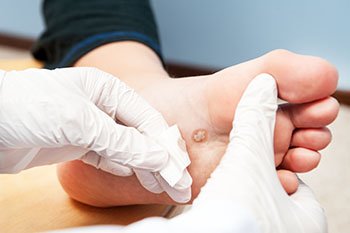Verrucae plantaris, or plantar warts, are viral lesions that form on weight-bearing areas of the foot such as the bottom of the heels and toes, and the ball of the foot. Because they are found on the bottom of the feet, they can feel especially painful and tender. Pain is commonly felt while walking or doing other physical activities. The tiny blood vessel that feeds the wart is sometimes visible, and may appear as a tiny black dot in the center of the wart. An Individual plantar wart can develop in a given area, or it can sometimes be clustered with others, forming what is called mosaic warts. Plantar warts can grow deep into tissue, making it harder for them to clear up on their own. They can often reoccur as well. For a speedier and more permanent resolution to plantar warts, contact a podiatrist to go over your treatment options.
Plantar warts can be very uncomfortable. If you need your feet checked, contact Dr. Steven Sheridan from Ankle & Foot Specialty Clinics. Our doctor will assist you with all of your foot and ankle needs.
About Plantar Warts
Plantar warts are the result of HPV, or human papillomavirus, getting into open wounds on the feet. They are mostly found on the heels or balls of the feet.
While plantar warts are generally harmless, those experiencing excessive pain or those suffering from diabetes or a compromised immune system require immediate medical care. Plantar warts are easily diagnosed, usually through scraping off a bit of rough skin or by getting a biopsy.
Symptoms
- Lesions on the bottom of your feet, usually rough and grainy
- Hard or thick callused spots
- Wart seeds, which are small clotted blood vessels that look like little black spots
- Pain, discomfort, or tenderness of your feet when walking or standing
Treatment
- Freezing
- Electric tool removal
- Laser Treatment
- Topical Creams (prescription only)
- Over-the-counter medications
To help prevent developing plantar warts, avoid walking barefoot over abrasive surfaces that can cause cuts or wounds for HPV to get into. Avoiding direct contact with other warts, as well as not picking or rubbing existing warts, can help prevent the further spread of plantar warts. However, if you think you have developed plantar warts, speak to your podiatrist. He or she can diagnose the warts on your feet and recommend the appropriate treatment options.
If you have any questions please feel free to contact our office located in Sandusky, MI . We offer the newest diagnostic and treatment technologies for all your foot and ankle needs.

